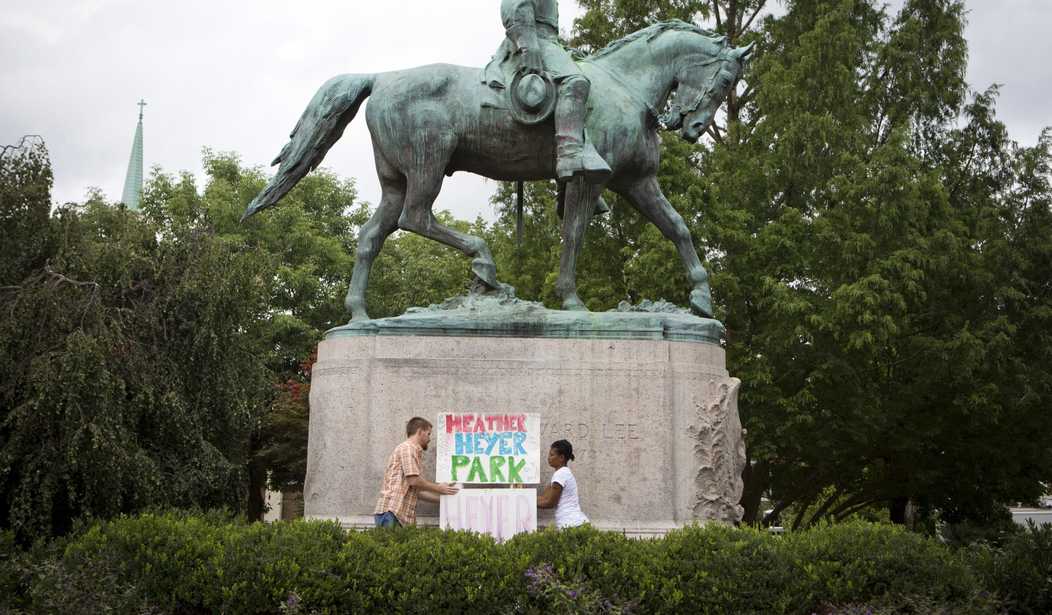Last weekend’s protest and violence in Charlottesville, Va., were sparked by the city council’s decision to remove a statue of Confederate General Robert E. Lee. But Lee’s own views on Confederate monuments prove rather revealing, and might surprise the white supremacists who defended his monument.
Lee himself attacked a proposed monument to the Confederacy, and even turned down an offer to commemorate a memorial of the pivotal battle of Gettysburg. Even so, a letter from President Dwight D. Eisenhower made the case for commemorating Lee.
“As regards the erection of such a monument as is contemplated; my conviction is, that however grateful it would be to the feelings of the South, the attempt in the present condition of the Country, would have the effect of retarding, instead of accelerating its accomplishment; & of continuing, if not adding to, the difficulties under which the Southern people labour,” Lee wrote in December 1866.
“All I think that can now be done, is to aid our noble & generous women in their efforts to protect the graves & mark the last resting places of whose who have fallen, & wait for better times,” the retired general concluded.
In August 1869, Lee turned down a request to meet with the other generals from the battle of Gettysburg (July 1-3, 1863) to mark the operations of both armies and to celebrate granite monuments.
“My engagements will not permit me to be present,” the retired general wrote in response. “I think it wiser, moreover, not to keep open the sores of war but to follow the examples of those nations who endeavored to obliterate the marks of civil strife, to commit to oblivion the feelings engendered.”
“It’s often forgotten that Lee himself, after the Civil War, opposed monuments, specifically Confederate war monuments,” Jonathan Horn, author of a Lee biography titled The Man Who Would Not Be Washington, told PBS.
Horn explained Lee’s thinking. “Lee believed countries that erased visible signs of civil war recovered from conflicts quicker,” the biographer said. “He was worried that by keeping these symbols alive, it would keep the divisions alive.”
James Cobb, history professor emeritus at the University of Georgia, told PBS that Lee “said he was not interested in any monuments to him or — as I recollect — to the Confederacy.”
“I don’t think that means he would have felt good about the people who fought for the Confederacy being completely forgotten,” though, Cobb said. “But he didn’t want a cult of personality for the South.”
Horn suggested that Lee would support removing Confederate monuments, but the retired general’s insistence on uniting the country might suggest a more nuanced position.
Lee has also inspired many generations of Americans, even if his memory has been twisted by the myth of the Confederacy’s “Lost Cause.” One of the strongest tributes came from President Dwight D. Eisenhower, who kept a picture of Lee alongside other “great Americans.”
In a letter from August 1960, Eisenhower praised Lee as an inspiring example to other Americans. “He was a poised and inspiring leader, true to the high trust reposed in him by millions of his fellow citizens; he was thoughtful yet demanding of his officers and men, forbearing with captured enemies but ingenious, unrelenting and personally courageous in battle, and never disheartened by a reverse or obstacle.”
“Through all his many trials, he remained selfless almost to a fault and unfailing in his faith in God. Taken together, he was noble as a leader and as a man, and unsullied as I read the pages of our history,” Eisenhower wrote. “From deep conviction, I simply say this: a nation of men of Lee’s calibre would be unconquerable in spirit and soul.”
“Indeed, to the degree that present-day American youth will strive to emulate his rare qualities, including his devotion to this land as revealed in his painstaking efforts to help heal the Nation’s wounds once the bitter struggle was over, we, in our own time of danger in a divided world, will be strengthened and our love of freedom sustained.”
The man writing these things about Lee was the same general who led American armies against Adolf Hitler in World War II. He would be just as angry as Lee would be to see white supremacists marching in Charlottesville under the banner of the Confederacy.
But Lee might not have endorsed removing the statues, either. The activism of removing the monuments has also inspired the animosity Lee so desperately tried to avoid.
It might have been better for America if the children and grandchildren of Confederate soldiers had not erected so many monuments to the Confederacy across the south. But remembering history is important, and Lee would have prioritized the tranquility of the country more than keeping (or even removing) the monuments.
It may be past time for Americans to remove monuments with explicitly racist messages — like the “Battle of Liberty Place” monument in New Orleans, La. — but citizens need to debate such issues and come to a mutual understanding, especially when it comes to statues of Robert E. Lee.
As Eisenhower argued, such a noble man ironically deserves such monuments, even though he opposed them. If any Confederate monuments are worth preserving, those focused on him should be at the top of the list — precisely because he asked not to have them.









Join the conversation as a VIP Member